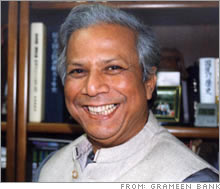Saving the world with a cup of yogurtNobel Peace Prize winner Muhammad Yunus, the father of microcredit, has a new idea. It's called social business enterprise, and the first step is a yogurt factory in Bangladesh. Fortune's Sheridan Prasso reports.(Fortune Magazine) -- Along a dirt road in Bangladesh's green, fertile heartland, 140 miles northwest of Dhaka, workers in flip-flops are hauling bricks, pouring cement and hammering boards. The object of their labor: a small yogurt factory being built by Danone, the French food company, on the outskirts of Bogra. It may not look like much, but the one-story building behind a wrought-iron gate is the epicenter of a Big New Idea - one that Muhammad Yunus, the winner of last year's Nobel Peace Prize for his pioneering work on microcredit, thinks can revolutionize a world still being transformed by his first big idea.  "I hope it will be an important landmark in the annals of business," Yunus says a few days later in Dhaka, at the opening ceremony for the factory in early November. "The concept it represents is very powerful." That concept is called "social business enterprise." It may not be as concise or as self-evidently defining a term as microcredit, but Yunus believes it represents the evolution of his old idea in a new direction. Yunus's first idea started with lending $27 out of his own pocket and a belief that the poor, particularly poor women, could be empowered as entrepreneurs if only they had the means to start their own small businesses. The institution he founded to fund them, Grameen Bank, took three decades to receive worldwide recognition but has now transformed thinking in the banking, development, and nonprofit worlds - attracting the political left to the idea of poverty alleviation and the political right to the idea that entrepreneurialism, rather than charity, is the solution. Even before winning the Nobel Prize, the self-effacing and charismatic Bangladeshi economics professor was becoming the equivalent of a rock star. He counts Bill Clinton among his close friends, has been hosted by princes and queens of Europe and was offered a private plane to Chicago to appear on "The Oprah Winfrey Show." Replicas of Yunus's program have spread to nearly every part of the globe, including Africa, Latin America, even Harlem. The resulting $9 billion microlending industry, which has drawn names that include Citigroup (Charts), Deutsche Bank (Charts) and the Bill & Melinda Gates Foundation, hinges on the belief that people do not need the threat of seized assets to have an incentive to pay back loans. Grameen boasts an audited repayment rate of 98 percent, far higher than the industry standard for loans to those who have collateral. Combatting poverty But microcredit is only half of what Yunus wants to leave as his legacy. Social business enterprise, he says, is next. The idea marries the interests of corporations with economic development in a way that has never been tried before. Companies would draw on microcredit-funded businesses to incorporate nonprofit models into their bottom-line operations, seeking not just revenue but social returns, and returning the profits to the communities where they operate. "If we can create this," Yunus says, "the world will be a much better place." To put it simply, Yunus believes not that Adam Smith's concept of profit-motivated, free-market capitalism is flawed, but that it is too limited. The conventional thinking that capitalism breeds wealth creators and competitors who spread that wealth by creating jobs and opportunities for the good of societies has not worked out very well for the majority of the world, Yunus says. And indeed, a recent UN study concluded that the richest 2 percent of the world's adults, mostly Americans, Europeans and Japanese, own more than half of global household wealth. |
Sponsors
|
